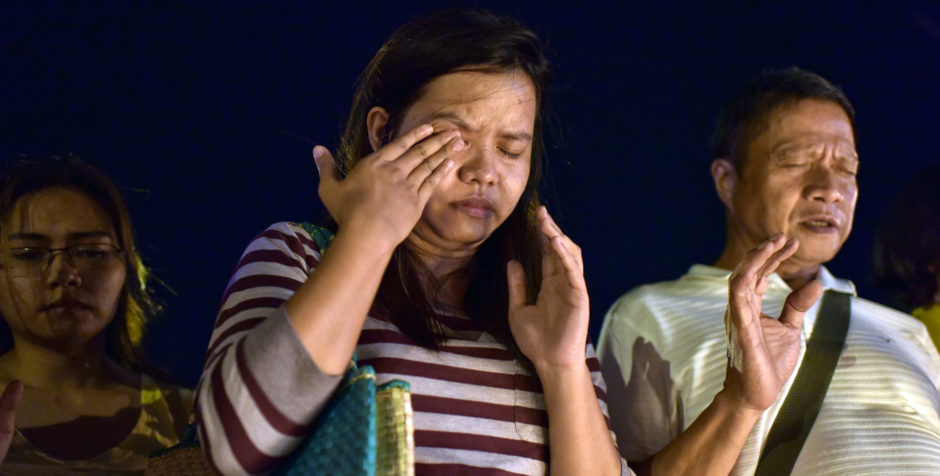ISIS Brutality Against Christians in the Philippines Has Been Unthinkable
There are far too many examples of the devastation that occurs when ISIS gets its way. And Marawi is the most recent illustration. After six months of terror and violence at the hands of ISIS, Philippine forces valiantly liberated Marawi, one of its cities on the southern island of Mindanao, in October. But this heroic effort was not without consequences. . . .
As we previously reported, a few dozen members of the Maute, an Islamic militant organization that pledged its support to ISIS, attacked the Christian city of Marawi in May and continued its spree of violence for over five months. Within just the first week, 103 people were killed. And in the end, this number rose to more than 1,000 in the bloody siege consisting of airstrikes, street battles, and sheer destruction. As is often the case in ISIS attacks, Christians were specifically targeted. The violence was undoubtedly graphic, as detailed in an Amnesty International report:
Militants often executed Christians at de facto checkpoints, which the Christians were approaching in order to exit the city. Militants usually performed the killings with a pistol, a rifle, or by cutting the victim’s throat. Journalists have reported cases where civilians were beheaded. Most victims were shot and killed immediately after being questioned by the military. Most victims were shot and killed while standing or kneeling on the ground; some were shot and killed while running away.
Marawi citizens themselves witnessed the horrendous killings. For instance, Hassan witnessed the brutal murder of six Christian carpenters when he was at a public market, stating, “I saw six men lying face down on the ground. It was very awful. [The militants] stepped on their heads and they grabbed their hair and then they shot them. . . . After they shot them, [the militants] started shooting in the air.” Furthermore, a Christian construction worker, John, witnessed militants shoot his colleague for answering he was Christian. In the midst of such violence and destruction, most citizens fled the city and the few daring to remain lived in evacuation centers and tents.
The battle continued to rage because ISIS called its supporters to travel to Marawi to engage the war and received operational support from ISIS leaders in Syria. ISIS maintained a strong network because of this assistance, and the battle for Marawi registered as the highest military death toll in recent Philippines history.
On July 24, 2017, the ACLJ sent a letter to the President of the Philippines, urging recognition and declaration of the atrocities committed by ISIS against Christians as genocide, in order to trigger the provisions of the Genocide Convention and provide relief and aid to religious minorities facing genocide. The Philippines Assistant Secretary of Foreign Affairs responded with an acknowledgement of the request, stating the Philippines was willing to “discuss [the] request with other relevant government agencies.”
While the city is now liberated, the matter is far from resolved. Due to ISIS, the city lays in ruins with homes in pieces, buildings in shambles, and debris lining the muddy streets. Categorizing this destruction as mere damage is an understatement, as many of the homes and buildings have been bombed, razed to the ground, or shot through entirely. For the Marawi citizens, their homes are largely unlivable, as 400,000 displaced residents cautiously return to parts of their ravaged city. One survivor commented that it now “looks like there is nothing to go back to.”
Although ISIS’s deadly hold on Marawi has ended, ISIS still looms in the background. There is still a very real threat that ISIS could continue to use this region as a springboard into Southeast Asia. Currently, many of the ISIS fighters have retreated to the marshlands of the town of Datu Salibo, about 130 miles south of Marawi. This swampy battle has been ongoing since August but has received little attention. As one analyst so aptly put it:
The battle for Marawi is [now] over, but the broader war on terror has entered a new phase. The ISIS message is ‘we’re not just confined to one geographic area — we have tentacles all over the world.’ This is not the end of ISIS; this is just a new chapter.
The communities in the region recognize that the war is not over and have braced themselves for future battles with ISIS. “I don’t like to fight. But this is our land and we will not let them take this like they destroyed Marawi,” said a veteran fighter who belongs to Red God’s Army, a Christian militia group. Many are concerned that this region is the “new land of jihad,” considering that “martyrdom can inspire others.”
The future of the region is truly at stake, and it is more pivotal than ever to vigilantly monitor ISIS in an effort to combat it on every side. We worked to bring international attention to this horrific matter from the outset and will continue to be at the forefront to combat ISIS’s expansion. Marawi was the latest example of ISIS brutality and attempted expansion, and we are more focused than ever to ensure that this evil is squelched.
